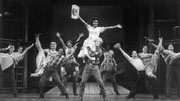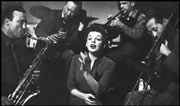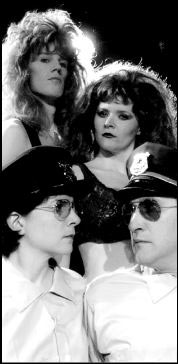THE MOST HAPPY FELLA
The 5th Avenue Theatre, 1308 Fifth, 292-ARTS, $17-$58 8 p.m. Tues.-Sat.; 7:30 p.m. Sun.; 2 p.m. matinees Sat.-Sun. ends Sun., March 24
SOMETHING’S universally appealing about cowboys who break into spontaneous song and dance. Or maybe there’s just something universally appealing about cowboys. In any case, musicals excel at fetishizing the American West, so a certain macho tension always exists between audience and actor, hero and heroine: No one is ever quite sure why an all-American man’s man knows anything about jazz squares.
The cowboys in Frank Loesser’s The Most Happy Fella aren’t cowboys, exactly; they’re ranch hands, which means they don’t wear chaps. They do wear boots and hats, though—and if that’s good enough for porn, then it’s good enough for me. Loesser is better known for writing sly comedies like Guys and Dolls and How to Succeed in Business Without Really Trying, so fans of either show will be surprised to find that Fella is pretty square stuff. It’s the story of Rosabella (Patti Cohenour)—her name conveniently rhymes with “fella,” see— who waits tables at a San Francisco diner. One of her customers leaves a mash note for her; he’s a Napa Valley grape farmer named Antonio (Julian Patrick). They start corresponding. Then Antonio, despairing that he’s not as handsome as he used to be, sends a picture of dreamy ranch hand Joey (Cheyenne Jackson) in place of his own. When Rosabella discovers Antonio’s deception, the choice is hers: She can either go with Joey’s swarthy charms or Antonio’s well-meaning, if slightly batty, adoration. Will she choose to stay with the title character? Can you guess?
Most of the show takes place in the sun-dappled valleys of Napa, which is perhaps part of the problem. The 5th Avenue’s new production appears to have been out in the sun too long—it’s overdone. Director David Bennett does his best to squeeze some funny business out of Loesser’s slight script, and the strain shows (the comic relief feels pretty desperate).
At least the vocals are first-rate. Cohenour and Patrick both lend much-welcome heft to their songs, and Jackson’s casual style fits Joey just fine. We also get a few moments of over-the- top musical bliss—the song “Big D” offers a glimpse of Loesser’s facility with big production numbers—but even those moments are fleeting and, more often than not, incongruous. The material never quite melds: Until the upbeat final act, the central story here is right out of Thomas Hardy, whereas the buoyant filler tunes occupy a different, less fated universe. As for the ranch hands . . . well, they break into spontaneous song and dance. That’s incongruous, too, but who’s complaining?








